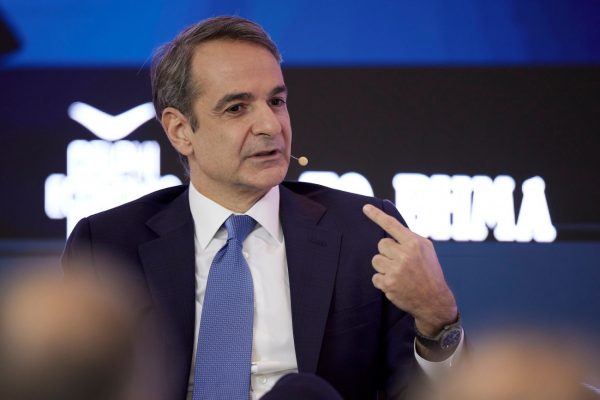
Bank of Greece (BoG) Gov. Yannis Stournaras this week again warned against a too austere policy by the European Central Bank (ECB) in setting interest rates, cautioning that “jumbo” rate hikes would risk damaging the European economy.
In an interview with Politico headlined “Greek central bank chief: ECB should slow rate hikes, needs allies in inflation battle”, and given in Frankfurt, the influential Greek central banker also called for more actions to contain inflation.
Asked about his native Greece, he said east Mediterranean country – after more than a decade of economic turmoil and three successive bailouts – is beating initial growth forecasts and avoiding a recession that looms over the Eurozone as a whole.
The interview reads:
More jumbo rate hikes by the European Central Bank would risk causing undue damage to Europe’s economy, Greece’s central bank chief said, calling for rate increases to happen at a slower pace.
Yannis Stournaras, who’s a leading dove on the ECB’s Governing Council, also urged tax and energy authorities to do more to tame inflation. Leaving the ECB to fight inflation alone could result in “skyrocketing interest rates” and “make the cost in terms of output much, much higher,” he told POLITICO in an interview.
The ECB raised rates by 75 basis points for the second consecutive time in October, marching ahead with the fastest tightening path in the central bank’s history. But Stournaras had made the case for a 50-basis point hike, he said. “Personally, I would have preferred a smoother path of interest rate increases.”
At that meeting, Stournaras said he had argued strongly that the eurozone was facing a supply-side shock — an imported energy-price shock — on which monetary policy has little influence. Second-round effects on wages as well as inflation expectations also remain contained, he added.
While Stournaras said that inflation soaring above all expectations to a record 10.7 percent may be seen as backing the case for aggressive tightening, he also pointed to a recent decline in energy prices supporting lower inflation forecasts and a slower pace of rate tightening.
“My personal gut feeling is that inflation next year will be less than the 5.5 percent assumed in our baseline scenario,” he said.
Trade-off
More broadly, Stournaras stressed that since the eurozone is a large net energy importer, monetary policy “faces an acute policy trade-off in its effort to tame inflation” as aggressive tightening risks further darkening growth prospects.
“The energy shock is going to impart a strong recessionary impulse to the economy. The weakening in our economies, but also in the US and globally, will lead to a further contraction of demand,” he said. “There are increasing risks that the euro-area could be headed into a recession.”
He pointed to a slew of data, including a slowdown of growth in the third quarter to 0.2 percent and a rapid decline in business-sentiment surveys.
As a result, economic realities are close to the most downbeat scenario of the ECB’s last macroeconomic projections. Those forecasts see the eurozone contracting by 0.9 percent next year. Worse, the eurozone is set to contract without the underlying assumption of the projection, namely that Russia is cutting off all gas supplies having materialized, Stournaras said. And “if the war continues, I see no reason why the economy would rebound.”
Commission, get moving
In the current environment, “monetary policy alone cannot deal with current inflation levels,” Stournaras said. “This would make the cost in terms of output much, much higher.” Instead, he called for support from fiscal and energy policies at least for as long as Russia is weaponizing natural gas.
“If we want to bring down inflation under the current circumstances without much damage to financial stability and without the interest rates skyrocketing, monetary and fiscal policy cannot go in opposite directions,” he said. “If fiscal policy is very relaxed, then, unfortunately, that means that interest rates are going to the sky, which we don’t want to happen.”
He added that he hopes fiscal policy next year will be more restrictive.
Stournaras also called for accelerated efforts to move towards a new pricing system for electricity. Currently, the electricity price is linked to natural gas prices. “Why should we stick to this model when Russia is weaponizing gas prices?” he asked.
Instead, Europe could price electricity on the average price of all fuels used in electricity production. Such an approach would reduce energy prices and overall inflation levels. “We wouldn’t be obliged to tighten monetary policy as much to affect expectations and medium-term inflation,” he said.
Stournaras said that a top Greek energy expert told him that it would take time for the European Commission to develop an alternative model. “We need to accelerate that,” he asserted.
Cautious and gradual
Stournaras also urged caution on the pending reduction of its almost €5 trillion in bond holdings. ECB President Christine Lagarde has previously said that policymakers would discuss the “key principles” of how to shrink these holdings at the December policy meeting.
“Any such steps should be cautious and gradual, as quantitative tightening reinforces interest rate increases across the yield curve,” Stournaras said. He pointed to a recent Bank of Greece Working Paper that found that global central banks’ large-scale asset purchases had helped push down long-term yields globally by as much as 330 basis points for AAA-rated sovereigns and up to 800 basis points for non-investment grade sovereigns.
“Scaling down central banks’ balance sheets to pre-crisis levels may lead to sharp increases in sovereign bond yields globally and widening spreads of vulnerable sovereigns, with severe consequences for financial stability and the economic prospects,” he said.
Stournaras said that it is the Governing Council’s consensus to only start reducing its bond holdings after the central bank is done with hiking rates.
He assured that the central bank stands ready to use its last crisis tool, the so-called Transmission Protection Instrument, to counter “disorderly market dynamics that pose a threat to the transmission of monetary policy across all member countries.”
The program was announced in July, after mounting rate hike expectations had driven up the spread between German and Italian 10-year bonds beyond 250 basis points, raising concerns over a comeback of a sovereign debt crisis. The program allows the central bank to buy bonds of a single member state under certain conditions.
Greece for growth
Turning to his native Greece, Stournaras said it will be less impacted by the trade-off between growth and inflation as economic prospects remain solid. “The Bank of Greece thought that we’re going to have 3.2 percent growth this year, but now we are revising it to 6 percent and it’s because of much higher receipts from tourism,” he said, adding that it seems like people spent aggressively all accumulated savings from the pandemic period.
The one-time problem child of Europe is expected to outpace the rest of the region over the coming years. “If you include the 2021 and 2022 GDP growth rates, it is not inconceivable to have an average growth rate of 3 percent during the [EU’s] Recovery and Resilience Facility time horizon.”
The adverse scenarios for the Greek economy, which would see the eurozone plunge into recession, do not foresee a recession for Greece.
Latest News

DM Dendias: We talk With Turkey But We Always Bring Up Their Unacceptable Positions
Second and last day of closely watched conference, entitled 'Metapolitefsi 1974-2024: 50 Years of Greek Foreign Policy', also included appearances by PM Mitsotakis, Ex-PM Tsipras and PASOK leader Nikos Androulakis, among others

Rhodes Airport Tops Fraport Greece’s Regional Airports in 2024 Performance
According to Fraport's data, more than 35 million passengers (specifically 35.2 million) were handled by Fraport-managed airports during the 11 months.

European Central Bank Cuts Interest Rates by 25 Basis Points
It is the fourth cut of interest rates by Europe’s central bank, a move expected by the markets and financial analysts leading to the rate settling at 3%.

Airbnb: New Measures Add €600 in Extra Costs for Property Owners
Property managers face an immediate administrative fine of 5,000 euros if access to the inspected property is denied or any of the specified requirements are not met.

Economist: Greece Included in the Best Performing Economies in 2024
Meanwhile, Northern European countries disappoint, with sluggish performances from the United Kingdom and Germany.

EasyJet Expands Its Routes from Athens
The airline’s two new routes will be to London Luton and Alicante and they will commence in summer 2025.

Capital Link Forum Highlights Greece’s Economic Resurgence; Honors BoG Gov Stournaras
Capital Link Hellenic Leadership Award recipient, Bank of Greece Gov. Yannis Stournaras, an ex-FinMin, was lauded for his pivotal role during Greece’s economic recovery

Tourist Spending in Greece Up by 14%, Visa Card Analysis Shows
Greece’s capital Athens emerged as the most popular destination, recording a 17% increase in transactions with Visa cards, surpassing even the cosmopolitan island of Mykonos.

Inflation in Greece Unchanged at 2.4% in Nov. 2024
The general consumer price index (CPI) posted a 0.4% decrease in November compared to the previous month

2024 Christmas Holidays: Extended Shop Hours Schedule
The 2024 Christmas Holidays extended shop hours schedule commences on Thursday, December 12 and runs until the end of the year.

![Φυσικό αέριο: Δυναμικό come back του LNG στην Ελλάδα [γραφήματα]](https://www.ot.gr/wp-content/uploads/2023/01/OT_naturalgas-90x90.jpeg)












![Fraport: Πάνω από 35 εκατ. επιβάτες στα αεροδρόμια το 11μηνο – Πτώση στη Μύκονο [πίνακας]](https://www.ot.gr/wp-content/uploads/2022/06/fraport-90x90.jpg)


















![Φυσικό αέριο: Δυναμικό come back του LNG στην Ελλάδα [γραφήματα]](https://www.ot.gr/wp-content/uploads/2023/01/OT_naturalgas-600x474.jpeg)








 Αριθμός Πιστοποίησης Μ.Η.Τ.232433
Αριθμός Πιστοποίησης Μ.Η.Τ.232433